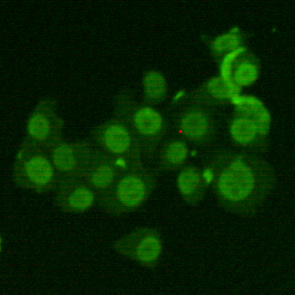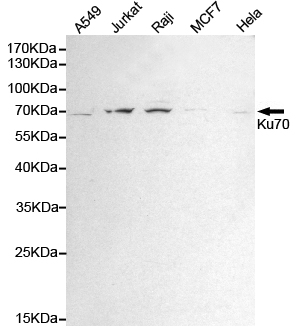-
Product Name
Anti-Ku70 (6H10) Mouse antibody
- Documents
-
Description
Ku70 (6H10) Mouse monoclonal antibody
-
Tested applications
WB, ICC/IF
-
Species reactivity
Human
-
Alternative names
5''-deoxyribose-5-phosphate lyase Ku70;5''-dRP lyase Ku70;70 kDa subunit of Ku antigen;ATP dependent DNA helicase 2 subunit 1;ATP dependent DNA helicase II 70 kDa subunit;ATP-dependent DNA helicase 2 subunit 1;ATP-dependent DNA helicase II 70 kDa subunit; antibody
-
Isotype
Mouse IgG2b
-
Preparation
Antigen: Purified recombinant human Ku70 protein fragments expressed in E.coli.
-
Clonality
Monoclonal
-
Formulation
Purified mouse monoclonal antibody in PBS(pH 7.4) containing with 0.02% sodium azide and 50% glycerol.
-
Storage instructions
Store at 4°C short term. Store at -20°C long term. Avoid freeze / thaw cycle.
-
Applications
WB: 1/1000
;ICC: 1/200
-
Validations

Immunocytochemistry staining of HeLa cells fixed with 4% Paraformaldehyde and using Ku70 mouse mAb (dilution 1:200).

Western blot detection of Ku70 in Hela,A549,MCF7,Jurkat and Raji cell lysates using Ku70 mouse mAb (1:1000 diluted).Predicted band size:70KDa.Observed band size:70KDa.
-
Background
Swiss-Prot Acc.P12956.It works in the 3'-5' direction. Binding to DNA may be mediated by XRCC6. Involved in DNA non-homologous end joining (NHEJ) required for double-strand break repair and V(D)J recombination. The XRCC5/6 dimer acts as regulatory subunit of the DNA-dependent protein kinase complex DNA-PK by increasing the affinity of the catalytic subunit PRKDC to DNA by 100-fold. The XRCC5/6 dimer is probably involved in stabilizing broken DNA ends and bringing them together.
Related Products / Services
Please note: All products are "FOR RESEARCH USE ONLY AND ARE NOT INTENDED FOR DIAGNOSTIC OR THERAPEUTIC USE"
